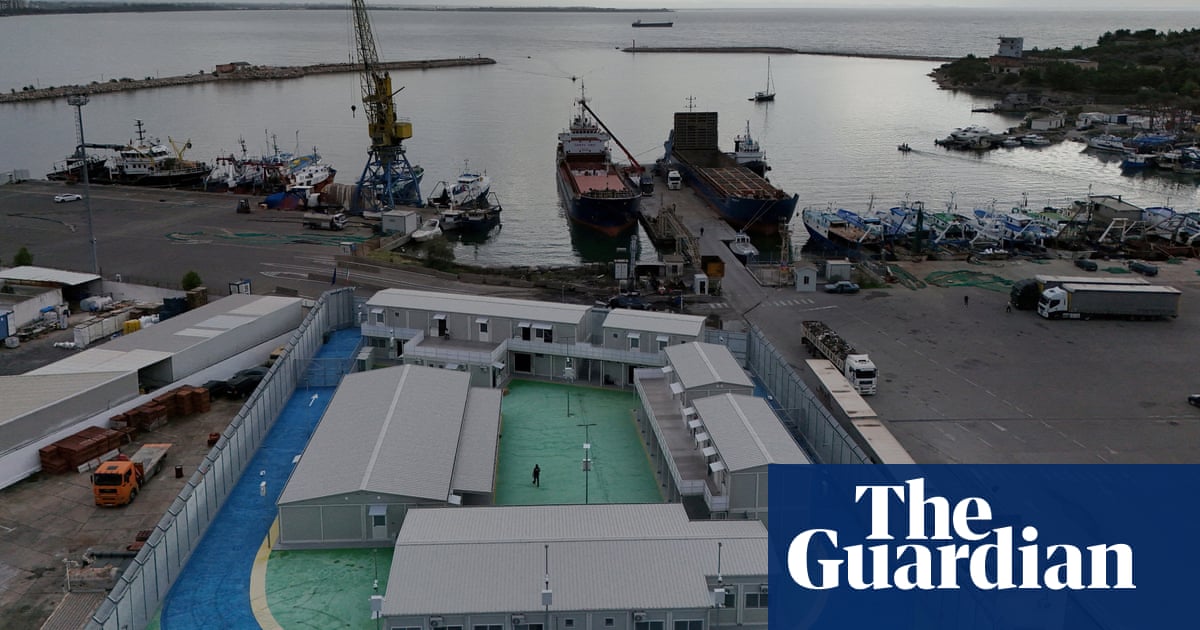When Italy opened migrant centres in Albania in October the plan was clear: 3,000 people a month intercepted in Italian waters would have their asylum claims processed beyond Italy’s borders, monitored by Italian police officers.
Two months later, undercover Albanian journalists posing as tourists caught up with some of those officers staying at a 5-star hotel with a pool and spa in Shëngjin, the Albanian port that houses the migrant centre.
“We came here for work, we are the security for the migrant centre […] but there are no migrants in the facilities, they have been transferred to Italy,” the officers told the Piranjat TV journalists. “It’s just us here. We are paid to act as tourists: breakfast, dinner, and sauna, all free – the Italian government pays.”
The facilities in Shëngjin where they were sent to work are empty: what had been presented by the European Commission as a new model for holding migrants outside the EU founded as Italian judges ruled it unlawful to keep people intercepted at sea in Albania before repatriating them to countries, such as Bangladesh and Egypt, considered “safe” by Rome. Only 24 asylum seekers were ever sent to Albania and none remain there. Five spent less than 12 hours in a detention centre, while the rest stayed for just over 48 hours.
At a time when Italy is struggling to balance its budget, cutting funds for education, health and social security, opposition parties have called the deal between Rome and Tirana, which will cost about €1bn (£830m) over five years, a “financial disaster”.
The Italian police officers secretly recorded by Albanian TV are among a few dozen left in Albania. In November about 50, along with dozens of social workers, returned home when it came to light the facilities were empty.
Late in November, the national daily Domani revealed that another Albanian detention centre, in Gjadër, meant to house asylum seekers, was occupied by stray dogs adopted by the 15 prison officers deployed there. “The prison officers have attended the dogs’ needs with love and patience, ensuring them food, water, daily medical care, and above all, a safe and affectionate environment,” it reported after visiting the centre.
The Italian government’s embarrassment over the scheme, attacked by opposition parties as a “complete failure”, has provoked a row between the authorities and the judges, who have been accused by far-right parties of obstructing the project after they upheld a 4 October ruling by the European court of justice that a country outside the bloc could not be declared safe unless its entire territory was deemed safe.
Months before the agreement between Italy’s prime minister, Giorgia Meloni, and her Albanian counterpart, Edi Rama, was signed, numerous NGOs, academics and experts had raised doubts about whether it could be considered humane or even legal under international law. Several European states have proposed solutions similar to Italy’s deal with Albania since 1993, with their proposals rejected.
Italy has indicated that the initiative is on hold as it searches for a solution that does not violate international humanitarian laws.
“The centres for migrants in Albania will work, even if I have to spend every night there from now until the end of the [term of the] Italian government,” Meloni insisted.
The prime minister’s credibility is at stake as her government has made immigration a central campaigning issue and has criticised predecessors for spending public money on managing the migration crisis. (The transport by sea on an Italian military ship for eight men who arrived in Albania cost €250,000 – more than €31,000 a person.)
“Why should we throw away the Italians’ money like this? Why leave law enforcement on vacation in Albania when we need personnel in our cities?” Matteo Renzi, leader of the opposition party Italia Viva and a former prime minister asked, proposing that Albanian prisoners in Italy be moved to the facilities in Albania.
“The Albania migration’s deal is one of the biggest farces in our history,” he added “It cost one billion euros, and it is serving as dog shelter.”
Source link https://www.theguardian.com/world/2024/dec/24/it-cost-1bn-and-its-a-dog-shelter-row-in-italy-as-albanian-migrant-centres-lie-empty


